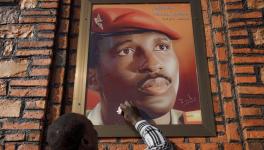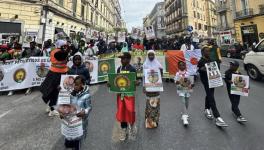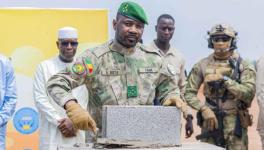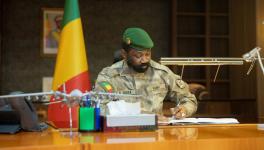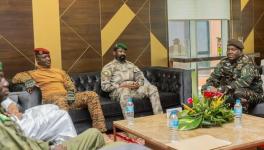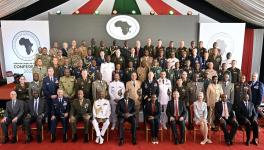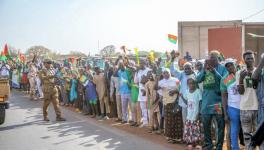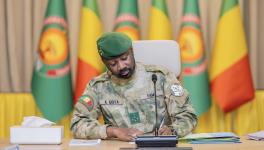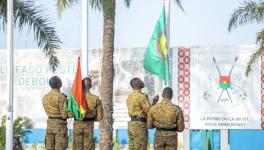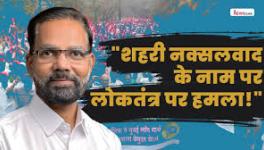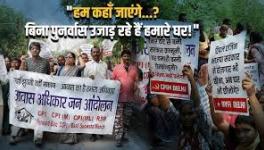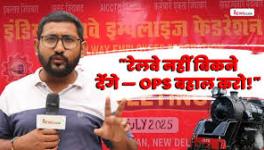‘Terrorism Today Comes From Imperialism’, Traoré Tells Putin
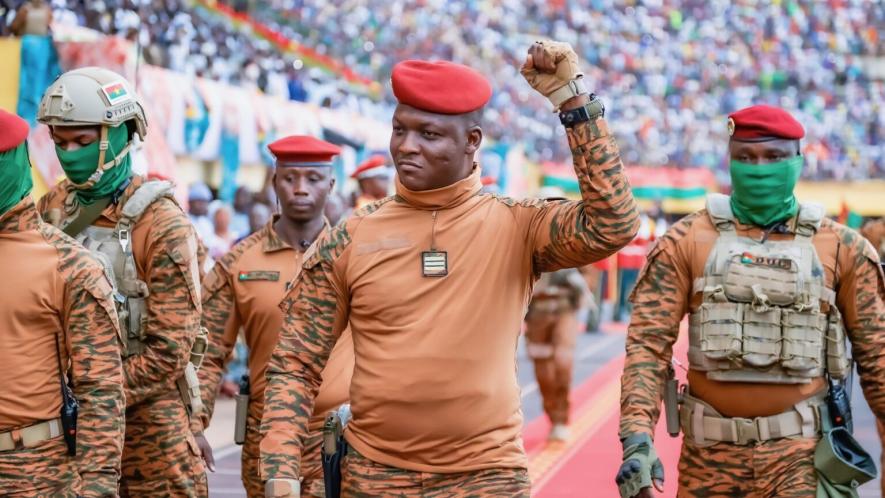
Captain Ibrahim Traoré, President of Burkina Faso. Photo: Ibrahim Traoré/X
The “terrorism we are witnessing today comes from imperialism, and we are fighting it,” Burkina Faso’s charismatic president, 37-year-old Capt. Ibrahim Traoré told Vladimir Putin on May 10.
The Russian president in turn assured him, “We are united by a common goal of fighting terrorism and extremism. We will continue to help the Republic in… suppressing the radical (Jihadist) groups that are still active in certain parts of Burkina Faso.”
The leaders met in Moscow a day after attending the Victory Day Parade on May 9, commemorating the 80th anniversary of the defeat of Nazi Germany by the Soviet Union in 1945.
European ingratitude amid tributes by the Global South
Except for Belarus, Serbia, Slovakia, and Republika Srpska, no other heads of state participated from Europe, whose liberation from Nazi occupation was in large part owing to the 27 million lives lost by the Soviet Union, suffering over a third of all casualties of World War II.
Referring to the war in Ukraine, the European Union issued a fatwa, warning, “Any participation in the 9th May parades or celebrations in Moscow will not be taken lightly on the European side.”
The US had also boycotted the commemoration. Ukraine’s president Volodymyr Zelenskyy even threatened that his government could not guarantee the security of foreign leaders attending the commemoration.
In defiance, state heads from 27 countries gathered in Moscow, mainly from the three continents of the Global South, including the presidents of seven African countries.
Why is Traoré in the limelight?
Traoré was among the most popular attendees, widely discussed in Russian media and on the African social media space, where he is compared to Burkina Faso’s first revolutionary socialist leader Thomas Sankara, often described in the West as “Africa’s Che Guevara”.
Traoré took power in late 2022 after the ouster of France-backed President Roch Kaboré that January, amid mass protests demanding the expulsion of French troops, ostensibly fighting terror groups that were only increasing their attacks and the territory under their control.
Within three months of taking power, he ordered the French troops out in January 2023, ensuring their withdrawal by February of that year.
After witnessing similar mass anti-French protests that led to the ouster of its President, domestically perceived as a French puppet, the popular military government of its northern neighbor Mali had also expelled French troops earlier in 2022.
Later in July 2023, Burkina Faso’s eastern neighbor Niger also took the same route. When threatened with war, Mali and Burkina Faso went to Niger’s defense. The military pact between the three made way for the establishment of the Alliance of Sahel States (AES).
People of the three countries can now travel without passports across the borders, largely secured by the joint efforts of their defense forces under AES. To disrupt their stability, France is arming and financing the terror groups, which it helped spawn across the region by destroying Libya in 2011, the AES has accused.
“The terrorists are reinforced by many foreign fighters and trainers,” Traoré reiterated in an interview he gave jointly to RT News and Sputnik during his visit. “But what is their interest?” asked the interviewer. “It’s not really terrorism, it’s imperialism,” Traoré replied. “Their goal is to keep us in a state of permanent war so that we cannot develop and they can continue to plunder our resources.”
Nationalization
In a move against this plunder, Traoré has nationalized the country’s main gold mines, valued at USD 80 million. His government has established a state-owned mining company to which foreign corporations mining in the country, including Russian Nordgold, are required to share a 15% stake in their local operations, in addition to transferring technical know-how to Burkinabes.
To break out from the bottom of the value chain by expanding beyond the production of only raw materials, Traoré’s government has set up Burkina Faso’s first gold refinery and plants to process agricultural produce like tomatoes.
Farmers are supplied with tractors and fertilizers to increase agricultural output. Acknowledging that Russia’s wheat donation in 2023 was used to feed displaced Burkinabes, Traoré added in his interview, “We made a promise to President Putin that we no longer wish to be supplied with wheat because we are going to produce the wheat. And I’ll keep this promise because we have started to produce the wheat in [sufficient] quantities to satisfy the local demand.”
Further, his government disallowed ownership of farmlands by foreigners, reportedly nationalizing all rural land this February, less than a year after limiting the private ownership of urban real estate to prevent land grabbing and speculation.
Airport infrastructure is expanding. Mobile clinics have been set into motion to improve healthcare access.
In a step toward breaking free from CFA Franc, his government has also launched a national postal bank to reduce dependence on this neocolonial currency through which France continues to wield monetary influence over its former West African colonies.
“Africa’s Most Popular Leader”
These measures have won him praise and support not only in Burkina Faso and its AES neighbors but across Africa and the young Black population in the US and UK, to the point that even Western media has come to acknowledge it.
“Everyone who has experienced racism, colonialism, and slavery can relate to his messages,” Beverly Ochieng, senior researcher at a global consultancy firm called Control Risks, told the BBC. Enoch Randy Aikins of South Africa’s Institute for Security Studies added that he is “arguably Africa’s most popular” leader.
However, the policies that have won him such popularity have also provoked the domestic and global elite.
A regime change operation against Traoré?
Earlier last month, the Commander of US Africa Command (AFRICOM) Michael Langley accused Traoré of using the country’s gold reserves to “protect the Junta regime”, rather than for the benefit of its people.
Retorting, Traoré said in his interview that Langley “should look himself in the mirror” and “feel ashamed”, adding that for the first time, Burkina Faso has accumulated gold reserves in its treasury.
Soon after making this accusation – widely construed as a classic maneuver from the US regime-change playbook – Langley visited Ivory Coast, whose government, hostile to Burkina Faso and the AES, continues to protect the orchestrator of Sankara’s assassination, Blaise Compaoré.
Amid heightened apprehension among his supporters that the US was plotting against him, yet another military coup attempt against Traoré was foiled on April 21. In its aftermath, thousands of people rallied in his defense in several African countries, expressing solidarity with the Burkinabes and their leader.
His popularity was also evident in Moscow as several Africans living there flocked around him for selfies soon after he descended the red-carpeted stairs from a Russian jet on May 9, clad in his combat fatigues with a holstered sidearm, donning his iconic red beret.
On his visit to Mendeleev University of Chemical Technology of Russia (MUCTR), African students welcomed him with a standing ovation. “There are young talents, inventors, and scientists in our country… but sometimes they lack the mathematical knowledge to perfect their invention,” he told the students.
“Science and education is our fundamental objective”
“But if we have branches [of Russian universities] or develop cooperation in some other way… then young people will have everything they need to study,” he added, placing “special emphasis on the field of science and education” in advancing ties with Russia.
He reiterated this in his meeting with Putin later that day, attended also by Russia’s Foreign Minister Sergei Lavrov, its Minister of Economic Development, the Deputy Chief of Staff, and Defense Minister Andrei Belousov, among others.
Traoré told them that “in addition to defense and security, there is another important sphere, namely, science and education. We would like Russia to help us educate our young people and teach them science so that we can develop our own production, industry, and engineering.” Calling for the opening of branches of Russian universities in Burkina Faso, he stressed, “This is our fundamental objective.”
“Unaware of their colonial history, many Africans are still asleep”
Putin opened this meeting after welcoming the Burkinabe delegates by acknowledging their country’s role in the victory over Nazism. “About 30,000 people from modern-day Burkina Faso fought as part of the anti-Hitler Coalition, in the Free France formations led by… General Charles de Gaulle,” Putin remarked.
“Some don’t even know that our grandparents fought – were put on the frontlines as cannon fodder,” Traoré recalled earlier in his interview, referring to the contribution of Africans from former French colonies to freeing France from Nazi occupation. “And when they returned, they were killed like animals” by France for demanding their own countries’ independence.
“All of this needs to be communicated so that young Africans understand. Because there are still many who are asleep, and continue to speak on behalf of the imperialists.”
Courtesy: Peoples Dispatch
Get the latest reports & analysis with people's perspective on Protests, movements & deep analytical videos, discussions of the current affairs in your Telegram app. Subscribe to NewsClick's Telegram channel & get Real-Time updates on stories, as they get published on our website.









